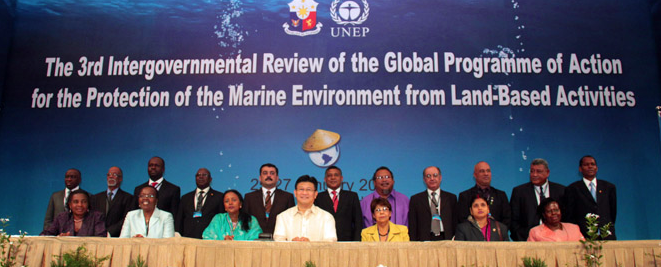The Third Intergovernmental Review (IGR-3) Meeting on the Implementation of the Global Programme of Action for the Protection of the Marine Environment from Land-based Activities (GPA) adopted the Manila Declaration, in which delegates underscore the dependence of people on the oceans and coasts and their resources for their survival, and that environment, "including in particular low-lying coastal areas and small island developing States (SIDS), is vulnerable to rising sea levels, climate-related natural disasters and ocean acidification resulting from land-based activities."
 27 January 2012: The Third Intergovernmental Review (IGR-3) of the Implementation of the Global Programme of Action for the Protection of the Marine Environment from Land-Based Activities (GPA) concluded with the adoption of the Manila Declaration on Furthering the Implementation of the GPA, and of the GPA’s Programme of Work 2012-1016. These outcomes will be forwarded for consideration and adoption by the UN Environment Programme’s (UNEP) Governing Council at its 12th Special Session.
27 January 2012: The Third Intergovernmental Review (IGR-3) of the Implementation of the Global Programme of Action for the Protection of the Marine Environment from Land-Based Activities (GPA) concluded with the adoption of the Manila Declaration on Furthering the Implementation of the GPA, and of the GPA’s Programme of Work 2012-1016. These outcomes will be forwarded for consideration and adoption by the UN Environment Programme’s (UNEP) Governing Council at its 12th Special Session.
At the meeting, which convened in Manila, the Philippines, from 25-27 January 2012, participants reviewed the implementation of the GPA, provided policy guidance for its further implementation, and adopted a Programme of Work for the GPA Coordination Office for 2012-2016.
The meeting was immediately preceded by a Global Conference on Land-Ocean Connections (GLOC), which took place from 23-24 January 2012, also in Manila, and provided recommendations from scientists and policy-makers to IGR-3.
Key elements of the Programme of Work include: addressing sustainable development as it relates to marine and coastal development; the need for viable partnerships and regional initiatives; priorities among the nine pollution source categories; and informing and addressing internationally agreed targets and issues. The GPA is to address these issues at all levels through: catalyzing change; taking advantage of existing mechanisms, including regional seas programmes; capacity building and technical support; assessment, monitoring and reporting on innovative and best practice approaches; and awareness raising and outreach.
In the preamble of the Manila Declaration (UNEP/GPA/IGR.3/CRP/1), delegates underscore the dependence of people on the oceans and coasts and their resources for their survival, and that the environment, “including in particular low-lying coastal areas and small island developing States (SIDS), is vulnerable to rising sea levels, climate-related natural disasters and ocean acidification resulting from land-based activities.”
In the operative part of the Declaration, they agree to, inter alia: commit to comprehensive, continuing and adaptive action within the framework of integrated coastal management; step up efforts to develop guidance, strategies or policies on the sustainable use of nutrients to improve nutrient use efficiency through the development and implementation of national goals and plans; decide that the GPA Coordination Office should focus its work on wastewater, nutrients and litter as the three priority source categories for the GPA, using global multi-stakeholder partnerships; consider using the GPA as a platform to promote delta management and to support a proposal to declare an international year of deltas in the near future; invite the GEF and other financial institutions, development partners and donor countries to make coordinated efforts to support developing countries in GPA implementation; request the UNEP Executive Director to forward the Manila Declaration to the UNEP Governing Council/Global Ministerial Environment Forum and to the UN Conference on Sustainable Development (UNCSD, or Rio+20); and request that IGR-4 be convened in 2016 to review implementation of the GPA. [IISD RS Coverage of GPA IGR 3] [UN Press Release] [UNEP Press Release] [IGR-3 Website] [IISD RS Story on GLOC]